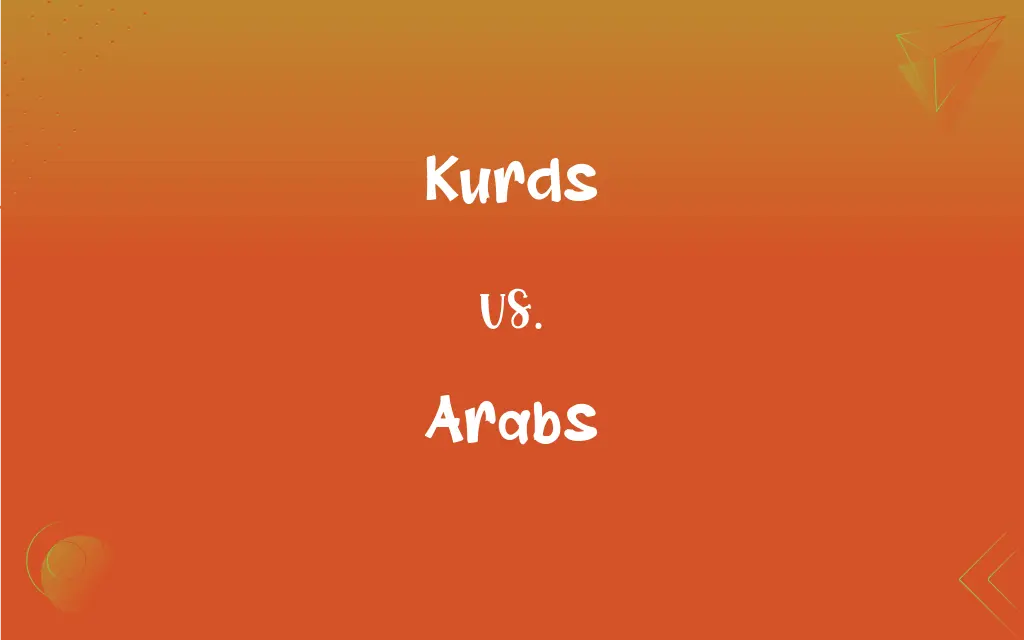Kurds vs. Arabs: What's the Difference?
Edited by Aimie Carlson || By Janet White || Published on September 2, 2024
Kurds are an ethnic group with their own language and culture, primarily living in Turkey, Iran, Iraq, and Syria, while Arabs are a panethnic group sharing the Arabic language and culture, spread across the Arab world.

Key Differences
The Kurds and Arabs represent two distinct ethnic and cultural identities within the Middle East and surrounding regions. Kurds are an ethnic group primarily inhabiting a region known as Kurdistan, which spans southeastern Turkey, northern Syria, northern Iraq, and western Iran. They have their own languages, which belong to the Iranian branch of the Indo-European language family, and a distinct culture, including unique traditions, music, and clothes. On the other hand, Arabs are a panethnic group that shares the Arabic language and culture, with a presence across the Arab world that includes 22 countries in the Middle East and North Africa. The Arabic language, part of the Semitic language family, serves as a unifying factor for Arabs, despite the diverse dialects and cultural practices across different regions.
Kurds primarily practice Sunni Islam, there are significant communities of Shia Muslims, Yezidis, Christians, and other religious groups within Kurdish populations. This diversity contrasts with the predominantly Muslim Arab world, where Islam (both Sunni and Shia branches) is the major religion, but there is also a significant presence of Christian Arabs and other religious minorities.
The political landscapes for Kurds and Arabs differ markedly. Kurds have sought greater autonomy or independence within their respective countries, leading to various degrees of conflict and negotiation with central governments. In contrast, Arab nations are characterized by their sovereignty, with political issues often revolving around governance, democracy, and regional conflicts. The Arab League serves as a regional organization aiming to unify Arab states in terms of economic, cultural, and political objectives.
Culturally, both Kurds and Arabs have rich traditions, literature, and arts that reflect their histories, struggles, and aspirations. Kurdish culture is celebrated through its folk music, dances, and storytelling, which often revolve around themes of resistance and the natural beauty of Kurdistan. Arab culture, with its deep historical roots, includes contributions to science, philosophy, literature, and art, influenced by various civilizations that have emerged in the Arab world over centuries.
Comparison Chart
Geographic Region
Primarily in Turkey, Iran, Iraq, and Syria
Across the Middle East and North Africa
ADVERTISEMENT
Language
Kurdish languages (Indo-European family)
Arabic (Semitic language family)
Major Religion(s)
Sunni Islam, with Shia, Yezidi, Christian minorities
Predominantly Islam (Sunni and Shia), with significant Christian minorities
Political Status
Largely stateless, with autonomous regions
Sovereign states, members of the Arab League
Cultural Heritage
Distinct music, dance, and clothing traditions
Rich tradition in literature, art, and science
Kurds and Arabs Definitions
Kurds
Kurds have a rich tradition of oral poetry and storytelling that reflects their history and struggles.
Kurdish poets have played a key role in preserving their people's identity and history.
ADVERTISEMENT
Arabs
The Arab world consists of 22 countries in the Middle East and North Africa.
The Arab League works to promote economic and political cooperation among Arab states.
Kurds
The Kurdish language includes several dialects and belongs to the Indo-European family.
Kurdish children in the autonomous regions often receive education in their native language.
Arabs
Arabs are a panethnic group united by the Arabic language and cultural heritage.
Arabic calligraphy is a highly respected art form across the Arab world.
Kurds
Kurds are predominantly Sunni Muslims but include diverse religious groups.
Kurdish religious diversity is a testament to the region's historical crossroads.
Arabs
The spread of Islam has deeply influenced Arab culture and identity.
The Quran, written in Arabic, is central to the religious life of Muslims around the world.
Kurds
Kurds are an ethnic group with a distinct language and culture, primarily residing in Kurdistan.
The Kurds celebrate Newroz as their traditional New Year and a symbol of freedom.
Arabs
Arabic literature is renowned for its poetry, prose, and philosophical works.
Classical Arabic literature includes the rich tales of One Thousand and One Nights.
Kurds
Kurdish political movements have historically sought autonomy or independence.
Kurdish political parties continue to negotiate for greater autonomy within their host countries.
Arabs
Arabs have contributed significantly to advancements in science, mathematics, and philosophy.
Arab scholars preserved and expanded upon the scientific knowledge of ancient civilizations.
Kurds
A member of a group of peoples speaking western Iranian languages and inhabiting the transnational region of Kurdistan in southwest Asia.
Arabs
A member of a Semitic people inhabiting Arabia, whose language and Islamic religion spread widely throughout the Middle East and northern Africa from the seventh century.
Arabs
A member of an Arabic-speaking people.
Arabs
An Arabian horse.
FAQs
What are the main religions of Kurds and Arabs?
Kurds are mostly Sunni Muslims with religious minorities, while Arabs are predominantly Muslim with significant Christian minorities.
How do the political aspirations of Kurds and Arabs differ?
Kurds often seek autonomy or independence, whereas Arab political issues mainly revolve around governance and statehood within existing nations.
Is Kurdish a single language?
Kurdish consists of several dialects but is considered a single language with different branches.
What challenges do Kurds face in their quest for autonomy?
Kurds face political, military, and diplomatic challenges in their quest for autonomy or independence.
What impact have Arabs had on global civilization?
Arabs have made significant contributions to global civilization in science, mathematics, literature, and philosophy, especially during the Islamic Golden Age.
What are the cultural contributions of Kurds?
Kurds have contributed to cultural diversity through their music, dance, poetry, and oral storytelling traditions.
What distinguishes Kurds from Arabs?
Kurds and Arabs differ in language, culture, and historical regions, with Kurds primarily in Kurdistan and Arabs across the Arab world.
Are Kurds and Arabs related ethnically?
While both groups have distinct identities, they share the Middle East as a common geographical region and have intermingled historically.
Do Kurds and Arabs speak the same language?
No, Kurds speak Kurdish languages, while Arabs speak Arabic.
What is the significance of the Arab League?
The Arab League promotes political, economic, and cultural cooperation among member states.
What role does the Arabic language play in Arab identity?
The Arabic language is a cornerstone of Arab identity, uniting diverse communities across the Arab world.
Have Kurds established their own state?
Kurds have not established an internationally recognized independent state but have autonomous regions in Iraq and Syria.
How do Kurds and Arabs view their historical lands?
Kurds view Kurdistan as their ancestral homeland, while Arabs see the Arab world as a region united by language and culture.
How do religious practices of Kurds and Arabs compare?
While both groups are predominantly Muslim, their religious practices and the diversity of faiths among Kurds reflect their distinct cultural backgrounds.
What are the future prospects for Kurdish autonomy and Arab unity?
The future of Kurdish autonomy and Arab unity depends on regional politics, international support, and ongoing efforts for peace and cooperation.
Can Kurds be found in Arab countries?
Yes, Kurds live in several Arab countries, including Iraq and Syria, where they form significant communities.
How do Kurds and Arabs celebrate their cultural heritage?
Through festivals, language preservation, traditional music, and storytelling, both Kurds and Arabs celebrate and preserve their cultural heritage.
What is the role of women in Kurdish and Arab societies?
The role of women varies widely across Kurdish and Arab societies, influenced by cultural, religious, and social factors.
How have Kurds and Arabs interacted historically?
Kurds and Arabs have a complex history of interaction, including periods of cooperation, conflict, and mutual cultural exchange.
What are the Kurdish and Arab contributions to the arts?
Kurds and Arabs have rich artistic traditions, including music, literature, and visual arts, reflecting their histories and identities.
About Author
Written by
Janet WhiteJanet White has been an esteemed writer and blogger for Difference Wiki. Holding a Master's degree in Science and Medical Journalism from the prestigious Boston University, she has consistently demonstrated her expertise and passion for her field. When she's not immersed in her work, Janet relishes her time exercising, delving into a good book, and cherishing moments with friends and family.
Edited by
Aimie CarlsonAimie Carlson, holding a master's degree in English literature, is a fervent English language enthusiast. She lends her writing talents to Difference Wiki, a prominent website that specializes in comparisons, offering readers insightful analyses that both captivate and inform.






































































